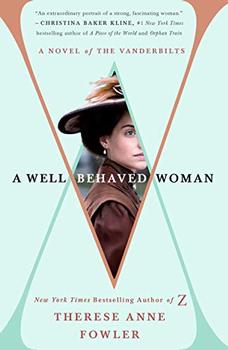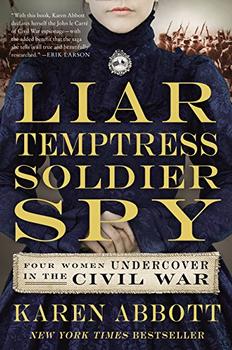Summary | Excerpt | Reading Guide | Reviews | Beyond the book | Read-Alikes | Genres & Themes | Author Bio

Perhaps Gone With the Wind is to blame, but novels about the Civil War are usually assumed to be about the South. Erin Lindsay McCabe's debut I Shall Be Near To You is a welcome deviation from the expected norm. Set in the North about a husband and wife who both enlist to fight for the Union, this story offers tender insights into the sadness of war. It also elaborates on a little-known historical fact: some women dressed as men to fight in the Civil War.
Rosetta and Jeremiah are young lovers who marry at the outbreak of the Civil War. Growing up in a sheltered farming community in upstate New York, they dream about moving to Nebraska, purchasing land, and running their own farm. Everyone expects the war to be over quickly, and the soldier's pay would provide the much-needed startup capital for the new venture. After Jeremiah enlists, Rosetta is left alone in a small cabin on his parents' property. Despite having spent her youth tending the crops and animals with her father, Rosetta's mother-in-law expects her to stay inside and sew. Caught between the memories of her childhood and an adulthood she does not want to experience without her husband, Rosetta struggles with her isolation. After a violent incident compounds her suspicions that life at home without Jeremiah is impossible, she shears her hair, changes her dress for a pair of her husband's pants, and begins the long walk to the Union camp. Upon arrival, she enlists under the name Ross Stone and claims to be Jeremiah's cousin. The soldiers are trained and sent into battle, where Rosetta and Jeremiah's marriage is put through the greatest test.
Though the opening scenes are useful in illustrating key points about the main characters — Rosetta's strong will, Jeremiah's sweetness — the novel comes alive when Rosetta enters the army. The earlier bucolic moments are replaced by the bustle of camp life and the anticipation of war. Rosetta's true gender remains a secret among the soldiers, and the fact that she is considered a man allows her open access to all aspects of living in a Union camp. McCabe's historical details are vibrant and compelling. The scene in the army prison when Rosetta guards Rose O'Neale Greenhow, a Confederate woman arrested for spying on the Union, and the battle at Antietam are some of the most riveting.
Beyond the fascinating historical details, McCabe's illustration of women at war is the novel's true point of interest. Rosetta's experiences are revelatory, but not unique. McCabe bases her depiction of Rosetta's time in uniform on more than 250 historical accounts of women who fought in the Civil War. When Jeremiah and Rosetta discover the body of a dead woman dressed as a male soldier, the moment undergirds the point — both in the book and reality — that Rosetta is not the first woman to travel this path.
McCabe does not limit her portrayal of women in battle to those fighting the army, however. In addition to serving on the front lines, there were a variety of ways for women to assist in the war effort. Jennie, the wife of Captain Chalmers, the head of Rosetta and Jeremiah's regiment, follows her husband into war, but not as a soldier. She tends to her husband and assists at the hospital. Rose O'Neal Greenhow offers an example of a woman's role in espionage. Clara Barton, the famed Civil War nurse, who helps one of Rosetta and Jeremiah's friends, typifies the dedicated women who committed themselves to helping sick and wounded soldiers, often at risk to their own health.
In addition to the immersive details about war and the portrayal of women's involvement, this novel is a love story. Rosetta's first-person narration paints a tender portrait of two lovers, desperate to stay together as the world contrives to tear them apart. Though Rosetta's dialect is often grating ("That gets my dander up, even if what that lady spy done is wrong, like he thinks she ain't smart enough to do more than gossip.") her spunky attitude and tenacity reveals a fascinating, appealing character. Rosetta is brave enough to choose her husband's love over a life of feminine conformity.
McCabe's novel is an engrossing one, and her main character Rosetta is unforgettable.
![]() This review was originally published in The BookBrowse Review in February 2014, and has been updated for the
September 2014 edition.
Click here to go to this issue.
This review was originally published in The BookBrowse Review in February 2014, and has been updated for the
September 2014 edition.
Click here to go to this issue.

If you liked I Shall Be Near To You, try these:

by Therese Anne Fowler
Published 2019
The riveting novel of iron-willed Alva Vanderbilt and her illustrious family as they rule Gilded-Age New York, from the New York Times bestselling author of Z: A Novel of Zelda Fitzgerald.

by Abbott Kahler
Published 2015
Karen Abbott tells the stories of four courageous women - a socialite, a farmgirl, an abolitionist, and a widow - who were spies during the Civil War.




Great literature cannot grow from a neglected or impoverished soil...
Click Here to find out who said this, as well as discovering other famous literary quotes!
Your guide toexceptional books
BookBrowse seeks out and recommends the best in contemporary fiction and nonfiction—books that not only engage and entertain but also deepen our understanding of ourselves and the world around us.